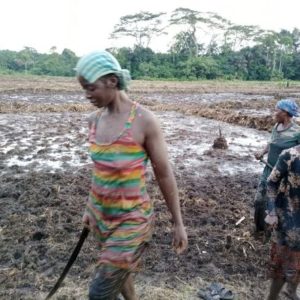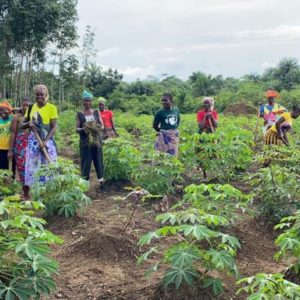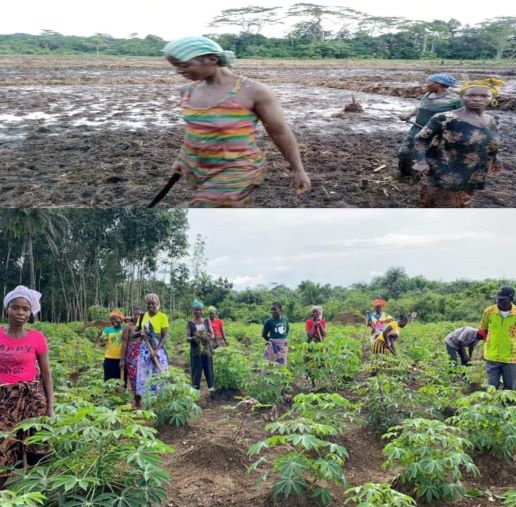By Louis Kuukpen, UNDP Liberia’s Deputy Resident Representative for Programmes
Over the past few months many parts of Liberia have experienced flooding following heavy rainstorms. The floods have driven many people, mainly the poor, out of their homes, and curtailed the business activities of petty traders. Many farmers are also raising alarm over anticipated crop failure which could further jeopardize the country’s precarious food security. This scenario reflects the increasing burden that climate change is imposing on the people of Liberia, many of whom are extremely vulnerable to climatic shocks.
Such effects were discussed at great length during the Africa Climate Week held in August in Libreville, Gabon. The event marked a major turning point on efforts to address climate change in Africa as governments, the private sector, civil society, youth, and indigenous communities sat side-by-side brainstorming on how best to address the reality of climate change.
Some of the key conversations dwelt on building resilience to climate shocks, accelerating the transition to less polluting energy sources, fast-tracking implementation of Nationally Determined Contributions (NDCs) – the government’s commitments to fight climate change, and ensuring whatever changes in lifestyles, or business and economic practices and models shall be fair and leave no one behind.


The gathering sought to build momentum ahead of the next international climate change conference (COP27) to be held in Egypt from 06-18 November 2022. This annual meeting brings together countries that have signed the UN Framework Convention on Climate Change (UNFCCC), together with civil society and the private sector.
COP27, which has been tagged the “Implementation COP”, offers the continent the opportunity to lead global climate conversations, champion the continent’s priorities including compensation for loss and damages caused by intensifying storms and rising sea levels in the case of Liberia, and build new partnerships to strengthen climate change mitigation and adaptation.
Following the Africa Climate Week, African countries again convened for a pre-COP meeting in Kinshasa, DRC in the first week of October and lamented the failure of developed nations to provide the pledged USD 100 million every year to developing countries for climate action.
Liberia has committed to reduce greenhouse gas emissions by 64 percent across almost all sectors of its economy, including agriculture and energy, by 2030.
The estimated cost for climate change mitigation and adaptation in the various targeted economic sectors in Liberia alone is an estimated USD 490,590,000.00 for the period 2021 to 2025.
UN Secretary General Antonio Guterres has described COP27 is “the number one litmus test” of how seriously governments take the growing climate toll on the most vulnerable countries. He has called for at least 50 percent of climate finance to be dedicated to adaptation and resilience and urged multilateral development institutions to “raise their game” to effectively support developing countries build climate resilience and adopt renewable energy.
There is consensus that climate change is profoundly amplifying Africa’s development challenges, and that the window for action is rapidly closing. It is time governments and multilateral partners agreed on the need to accelerate implementation of climate mitigation and adaptation, especially prioritizing the critical sectors of agriculture and energy.
Globally, agriculture and energy are significant sources of greenhouse gases responsible for climate change. In Liberia, agriculture is the most vulnerable sector to climate change, providing primary livelihoods to more than 70% of the population. Shockingly, 49% of Liberians are considered food insecure with approximately 83% living below the poverty line on less than US$1.25/day. Unmitigated climate change would devastate the sector and the country.
Farmers and food production systems are already hard hit by flooding occasioned by heavy rainstorms. Adapting food production systems to climate change, and promoting clean, renewable energy could improve food security and increase efficiency in agricultural value chains, safeguarding farmer livelihoods, and the national economy.
While Liberia’s NDC commitments are bold, without proper management and investment, they could harm farmers and their livelihood base, leaving them impoverished and stranded with few livelihood options. Research suggests that agricultural growth presents the best opportunity for poverty reduction in rural areas. Liberia’s climate commitments, if properly implemented, are therefore critical for safeguarding the agricultural sector from the ravages of climate change, and poverty eradication.
Aside from climate change, Liberia’s agriculture is also grossly undermined by lack of good, affordable farm inputs, extremely limited access to finance, poor access to energy for value addition, poor road networks, and high transportation costs. Thousands of smallholder farmers also use limiting traditional practices and technologies requiring tailored investment and capacity building support to build their resilience to climate shocks.
It is imperative that policy shifts and planned actions recognize and acknowledge the huge burden and barriers that farmers, especially women, face in agriculture. Proposed actions must recognize the stewardship provided by women in national food security, in land and biodiversity management, and appropriately invest in them and their production systems to help them to adapt to the changing times we live in.
Proposed actions must also provide for a “just transition” that re-aligns food systems to global climate solutions that support production of food for all Liberians, promote gender equality, and the rights of farmers, as well as ensure social protection for the vulnerable populations, including women.
The transition to a low-emission economy driven by clean renewable energy needs acceleration through partnerships and investments in solar and hydropower, both of which have huge potential for climate change mitigation in Liberia and unlocking the country’s agricultural productivity.
Just transition in the agriculture and energy sectors of Liberia should incentivize rural farmers and small businesses whose voices are rarely heard, to participate in decision-making processes, and support capacity building and creation of requisite social safety nets for the people of Liberia. A well incentivized transition would motivate people and communities to embrace climate action and become powerful advocates of the transition to a clean, green, low-emission economy.
In the build-up to COP 27, there is a need for national leadership, strengthened governance and increased political will in implementing the NDC. There is also a great urgency for partners to support the country in achieving its ambitious NDCs. UNDP stands ready to work with all partners to support Liberia in this process to continue exploring the various facets and opportunities that would effectively address the climate emergency, and we ask that you join us!

